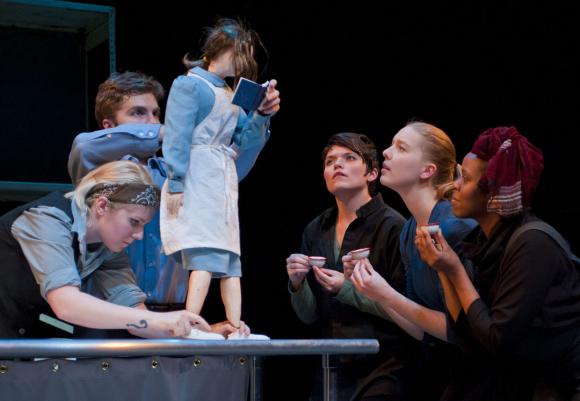PROVIDENCE, R.I. [Brown University] — Playwright Erik Ehn has dedicated much of his professional career to fighting against genocide. It was a theme that came to him when, shortly after graduate school, he found himself struggling to find meaning in his writing.
“I had a crisis of purpose, and my mother, in a very good piece of advice, said, ‘If you’re stuck, help somebody until you figure things out.’ So I started working in a soup kitchen and I realized that [advocacy] was a mission for writing,” Ehn said.
Trips to Guatemala, Serbia, and, later, to Rwanda and Uganda solidified the subject matter for Ehn, and for the last 20 years genocide has been a constant theme in his plays. Ehn will present that life’s work, a compilation of 17 plays titled Soulographie: Our Genocides at the La Mama Experimental Theatre Club in New York City Nov. 11-18, 2012.
The plays will be performed in rotation, completing the cycle over the course of a nine-day marathon. The plays range in duration from 15 to 90 minutes and represent a variety of formats, but all are centered around 20th-century America’s relationships to genocides in the United States, East Africa, and Central America. Some examine actual historical events, such as the Tulsa Race Riots, while others are more abstract, bringing to light ideas and themes rather than a specific chronological timeline.
“My goal with Soulographie is to approach genocide from as many points of view as I can. It’s meant to be too much and more than anyone can see and more than anyone can withstand. The idea is to increase space, to stretch out a space for imagining and empathizing and paying attention to genocide,” Ehn said.
In advance of the New York performances, Ehn has organized a series of events at Brown and in Providence, starting with the Brown premiere of Yermedea, one of the Soulographie plays, which runs at Brown’s Leeds Theatre Sept. 20-30, 2012. Set in Central America, the play draws inspiration from the horrors of the civil war in El Salvador and explores the social and psychological effect of life lived in the midst of genocide. Directed by Kym Moore, assistant professor of theatre arts and performance studies, the play is a hybrid puppet theatre performance where the live actors not only manipulate the puppets but act alongside them. Puppeteering is being directed by Alejandra Prieto Garcia, a visiting assistant professor and puppet artist from Madrid.
Ehn, who incorporates puppets into roughly half of the Soulographie plays, said that it’s a style of theatre that he’s always been drawn to because of how the presence of the puppets changes the audience dynamic. “They’re physical and gorgeous but also abstract and dark. Because a puppet only seems to be looking back at you, you can stare at it in a different way than you can stare at a human actor. A puppet is strong and can withstand your interrogation,” Ehn said.
In addition, free open rehearsals for Maria Kizito, another Soulographie play, will take place in October at 95 Empire Street in Providence and will also bring together the play’s Ugandan and American actors for discussions.
In September and November, the All That Rises series, co-sponsored by the Department of Theatre Arts and Performance Studies, the Creative Arts Council, and the Office of International Affairs, will convene a special series of workshops, panels and performances centered around Soulographie. Events include puppet workshops and performances by artists from Spain, Los Angeles, and Indonesia, and discussions on how visual art can be used to address healing from trauma, especially in cases of genocide and war. Artists include the Indonesian puppet theatre group, Papermoon, presented in collaboration with FirstWorks, and Paul Lazar from the Wooster Group performing Suzanne Bocanegra’s When a Priest Marries a Witch. Guest speakers come from Northern Ireland (Pauline Ross), Serbia (Dijana Milosevic), Argentina (Claudia Bernardi), and Uganda (George Ongom).
The complete schedule of events, including information about ticketing, is online at the Department of Theatre Arts and Performance Studies website.
Events
September 20-23 and 27-30
Yermedea
Leeds Theatre, 77 Waterman St.
Showtimes are Thursday-Saturday at 8 p.m, Sunday at 2 p.m.
September 29-30
All That Rises: A Question of Scale
Saturday, September 29
- 10 a.m. — Puppet workshops with Papermoon, Alejandra Prieto Garcia and Automata
RISD Expose, 232 Westminster St. - 2 p.m. — Writing workshops with Jeff Jones and Normandy Sherwood
Brown University, Lyman Hall - 7:30 p.m. — When a Witch Marries a Priest
Brown University, McCormack Family Theater
Sunday, September 30
- Noon — Presentations and discussions with the artists, led by Charlotte Meehan of Wheaton College
McCormack Family Theater - 4 p.m. — A performance by Papermoon.
RISD Auditorium
October 11-14
Yermedea performances and talkbacks
95 Empire Street, Providence
Performances and workshops continue with director Kym Moore and puppet artist Alejandra Prieto Garcia in preparation for performances at La Mama in New York City.
October 15-19
Maria Kizito rehearsals and workshops
95 Empire Street, Providence
The directors and actors in Maria Kizito come to 95 Empire Street to rehearse and present open rehearsals before going to New York. All are emerging Ugandan and American artists and cultural makers. Maria Kizito is a spiritual biography of a Rwandan genocidaire, the young nun Maria Kizito as mediated by a young American nun who attends her trial.
November 20
All That Rises: Art and Healing
McCormack Family Theater
A series of international panels on uses of performance and visual art to address healing from trauma, especially in cases of genocide and war. Guest speakers come from Northern Ireland (Pauline Ross), Serbia (Dijana Milosevic), Argentina (Claudia Bernardi) and Uganda (George Ongom).

